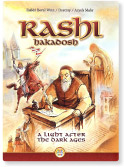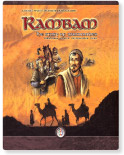Previews & samples of the educators guide
DOCUMENTARY THE HISTORY & ORIGINS OF ASHKENAZIC JEWRY MOVIE DVD CHAPTERS
Audience responses
“Marvellous – for children & adults alike.”
Boston Jewish Film Festival
“We are very pleased to inform you that we screened “Rashi” several times in our auditorium before a varied public of children and adults. The responses were excellent. Everyone enjoyed the film very much. The film is undoubtedly enriching the educational activity of Beth Hatefutsoth which is one of the most important aims of the museum. We sincerely thank you”.
Gila Cohen – Visual Documentation Center – Films, Beth Hatefutsoth, Museum of the Jewish Diaspora, Tel Aviv
“A Wonderful film!”
Tzivos Hashem – New York

FILM SYNOPSIS
Rashi, A Light After the Dark Ages is the story of an unusual hero, a Bible commentator, who lived in 11th century France during the time of the Crusades. A judge, spiritual leader, commentator and teacher, Rashi made such far-reaching contributions to Judaism that both the beginner student, and advanced scholar, today learns Torah with Rashi.
Born in 1040, Shlomo Yizchaki left his hometown of Troyes for Worms and Mainz, centers of Jewish learning, where he would cultivate his learning of the Torah. He returned to Troyes to become the spiritual leader as well as a proficient author of interpretations of the Talmud and Bible.
Soon, Rabbi Shlomo Yitzchaki became the Jewish leader of the whole of France, becoming “Our Rabbi” Shlomo Yizchaki, otherwise known by its acronoymn “Rashi”. He continued to write his commentary on the Babylonian Talmud, but as he grew older, Rashi took on his Bible commentary, establishing his concise and profoundly simple style.
Rashi had two daughters whom he taught to read and write Hebrew and French in an age of illiteracy. He also shared with them the intricacies and wisdom of the Talmud. His daughters married Torah scholars who produced children who became scholars as well, ultimately earning the family the title of The House of Rashi.
The film shows many scenes that illustrate, with historical accuracy, the character and personality of Rashi. At the Troyes fair, for instance, a Jewish merchant allegedly cheated a non-Jewish customer over the proper measurement of 12 lengths of Flax. Rashi found the merchant guilty and went on to teach him the Torah’s view on the importance of being honest in dealing with weights and measures. Rashi’s role as judge and love of teaching Torah were inseparable.
Rashi was a teacher not only to his formal students but also to his many grandchildren. Rashi is portrayed as a loving and warm grandfather who used his depth of wisdom to communicate to the next generation in a simple and spirited way. In the Sukkah scene he explained to his grandson, as he does in his commentary, exactly what “putting a stumbling block before the blind’ and “when a king sins” means in the Torah – and the lessons they teach us.
Rashi’s sensitivity to both Torah law and humanity is also evident in the film. While conversing in the sukkah with his most diligent student, Rabbi Simcha of Vitri, a townsman interrupted them to tell them that the town’s blacksmith had died. At the funeral, Rashi sensitively told the family that as it was the festival of Sukkos, holidays take precedence over personal loss and eulogies are not permitted. After the funeral, however, the family sat at home in mourning despite Rashi’s ruling. In a seemingly surprising turn of events, Rashi told the family to stay sitting on the floor if their grief would not allow them to celebrate. Rashi’s explained privately to his son-in-law that he had underestimated their grief and they should come to understand G-d’s will in this fashion.
Throughout the film Rashi encounters his friend the Inkman. In his conversations with the mysterious ink merchant from Algiers, Rashi’s personal side emerges. Rashi shares his own weaknesses with the Inkman and his deep concerns over the welfare of his Jewish community. The Inkman becomes Rashi’s confidante and source of support amidst the tormenting events around him.
Backdropping the film is the major theme of the Crusades. While the Crusades did not ignite its flames in the city of Troyes, Rashi nevertheless felt their crimes directly as the spiritual leader of the French Jewish community. As the head judge of the Beis Din, he had to deal with new issues such as the status of a Jew who was forcibly converted. And as a leader, Rashi had to deal with the Church leadership himself with Jewish welfare as his main concern.
As Rashi grew old, he primarily dictated his commentaries to his grandson who would later be known as the famous Talmudic commentator Rashbam. Near death, Rashi composed seven penitential prayers called Selichot. Rashi died with the word “tahor”, pure, on his lips. His service of G-d and service to the Jewish people was permeated with a pure desire to do the will of Hashem all the days of his life.






